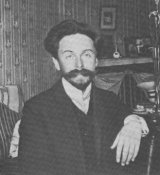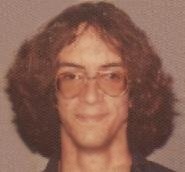


In the early 1970s, there appeared a unique pianist known to us only as Shadow. Though his talent burned brightly for just a few years, some details of his life are known: he first heard the music of Alexander Scriabin in the summer of 1972, in a particularly receptive frame of mind, and became instantly obsessed with it, performing several of the late sonatas at the University over the next few years.
When Shadow first thought to play Scriabin himself, he chose the Sixth (Sonata no. 6, 1911), as it had been the first he heard. Scriabin once described the Sixth by saying "open wide the dragon's pasture", and the shattering experience of hearing it for the first time made Shadow realize that he had to learn a whole new way of playing. After transferring from one campus to another, the Sixth was the first he performed in recital.
But the real prize was the Seventh Sonata (1911): Scriabin considered it sacred, calling it his White Mass and describing its opening as depicting "angels bearing clouds of incense". Although its exotic harmonies entranced those who heard Shadow play it, it was not long before the hideous dissonances of the Black Mass (Sonata no. 9, 1913) came drifting from his practice room like an evil effluvium, filling all who heard it with horror and dread. When he finally performed it in 1975, it was with the aid of the University's new computerized lighting system, which attempted to re-create Scriabin's synaesthetic hallucinations for the audience based on Shadow's harmonic analysis of the score (see poster below right). As for Shadow himself, he dressed all in black with only a slit of light revealing his hands behind a scrim curtain, over which the mystic lights coruscated. Those who experienced this performance walked away in fear for their sanity, and it was shortly afterward that Shadow disappeared, never to be seen or heard from again. Surely the whispered tales — that unspeakable beings conjured by his playing had borne him away to some nameless dimension — cannot be true... can they?
It is not known how these recordings of Shadow's playing have come down to us, and they are somewhat the worse for wear (as is Shadow's playing, for by that time he is said to have been plagued by pains in his forearms, the result of far too many hours in the practice room). But if you are willing to follow him into the eldritch world of this music, you will hear the very playing that so unsettled his listeners all those years ago.
The Dragon's Pasture (Sonata no. 6, 1911) The Sixth was recorded in April 1974, and was performed on the University's exquisite German Steinway. This instrument was made for Scriabin, and Shadow is learning to exploit that. Although he still struggles, he often succeeds, and there are moments of exotic, other-wordly beauty where multiple strands of melody compete for our attention.
The White Mass (Sonata no. 7, 1911) The Seventh was recorded in March 1975 (see program at left), and was also performed on the German Steinway. Although his playing sometimes teeters on the edge of the abyss, we can plainly hear the results of Shadow's obsession with subtle layers of dynamics and voicing, as well as the wildly fluctuating tempi which were the hallmark of his Scriabin interpretations.
The Black Mass (Sonata no. 9, 1913) This recording, from December 1975 (see poster at right), was made in a practice room at the University for Shadow's private use, which accounts for its poor sound quality. It is almost as if we were not meant to hear these diabolical sounds (and as far as anyone knows, the videotape of the actual performance has been lost). Still, we can hear how Shadow's playing could have instilled such terror in those few who heard it at the time... and were never the same again.